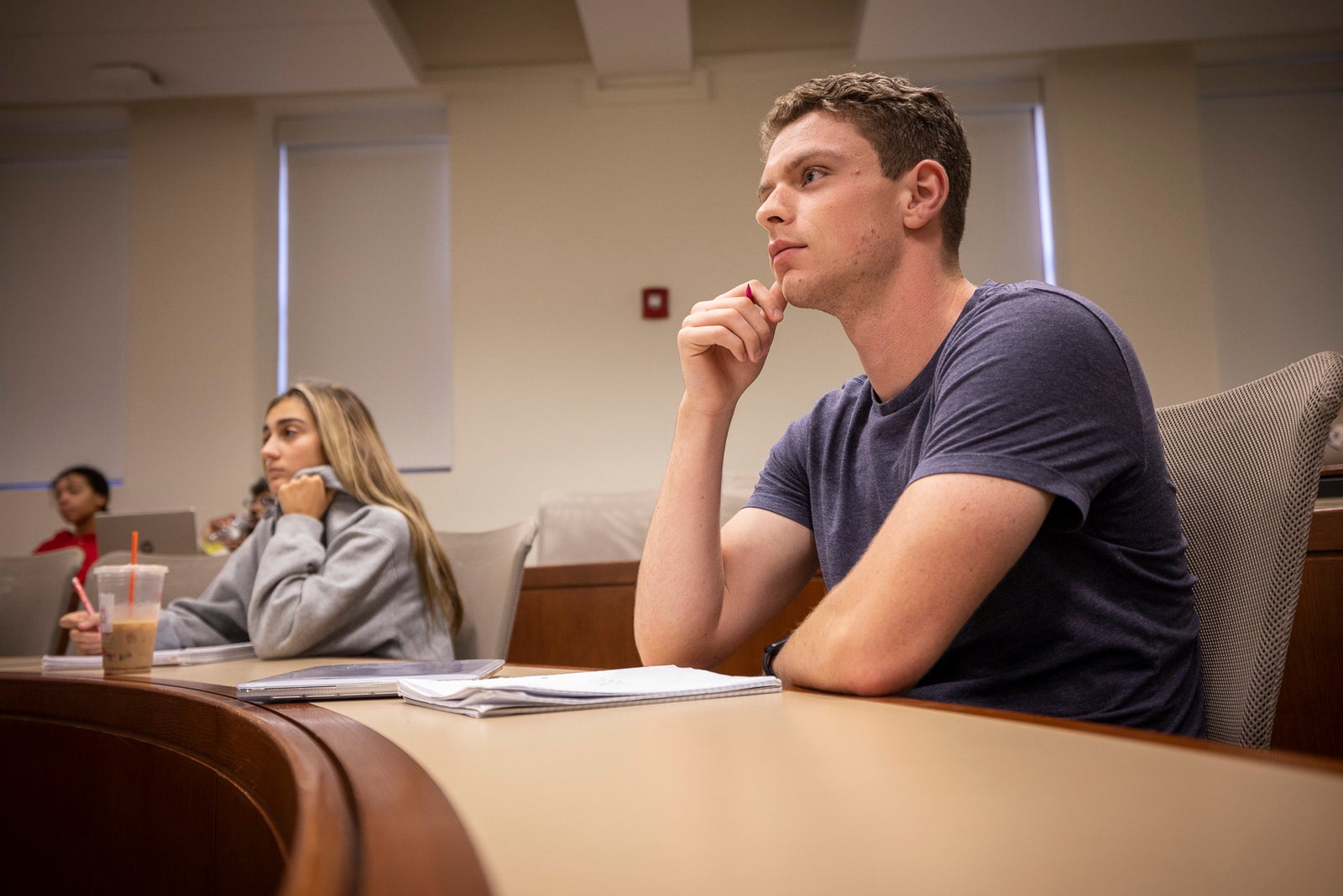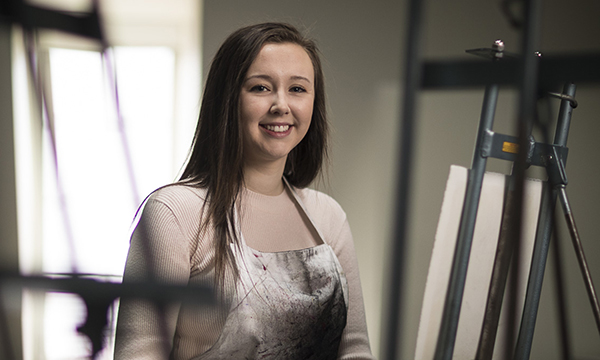Art therapy uses the creative process in artistic self-expression to enhance the physical, mental and emotional well-being of individuals of all ages.
In Emmanuel’s art therapy program, you will develop the artistic and evaluative skills needed to help individuals increase insight, develop interpersonal skills and coping mechanisms, manage behavior, reduce stress and increase self-esteem and self-awareness. Our Boston location affords students unmatched internship opportunities to work in non-clinical settings, as well as at such institutions as Massachusetts General Hospital, Boston Children's Hospital and Dana-Farber Cancer Institute, just to name a few.
A First-Class Experience
Get to know the people and programs that will define your academic journey.
Senior Thesis Art Show

Congratulations to our graduates on their senior thesis presentations.
Senior Thesis Art Show

Congratulations to our graduates on their senior thesis presentations.
Senior Thesis Art Show

Congratulations to our graduates on their senior thesis presentations.
Senior Thesis Art Show

Congratulations to our graduates on their senior thesis presentations.
Senior Thesis Art Show

Congratulations to our graduates on their senior thesis presentations.
Senior Thesis Art Show

Congratulations to our graduates on their senior thesis presentations.
Senior Thesis Art Show

Congratulations to our graduates on their senior thesis presentations.

Meet the Faculty
Our distinguished faculty publish, exhibit and research. Present, compose and chair. Inspire and collaborate.
The Curriculum
View the 2024-2025 Academic Catalog to find course titles, numbers and descriptions.
Requirements for Pre-Professional Program in Art Therapy:
Studio Art:
- ART1401 Drawing I (AI-A) (VCI)
- ART1407 Visual Language for Design and Communications (AI-A) (VCI)
- ART2403 Design and Composition
- ART2433 3D Form Studies (AI-A)(VCI)
- ART2451 Ceramics I (AI-A) (VCI)
- ART3101 Painting
Art Therapy:
- ART2301 Introduction to Art Therapy
- ART3302 Principles of Art Therapy
Psychology:
- PSYCH1501 General Psychology (SA) (SS)
- PSYCH1503 Lifespan Development
- PSYCH3601 Counseling Theories and Techniques
- PSYCH3210 Child Psychopathology OR
- PSYCH3212 Adult Psychopathology
- One additional psychology class at the 2000 or 3000 level
Capstone:
- PSYCH4494/PSYCH4495 Applied Internship I and II
Upon completion of the art therapy program, students will:
- Acquire an awareness of the history of art therapy
- Learn about the origins of art therapy, including its founders and current trends and developments in the field
- Gain introductory skills in treatment planning and assessment by increasing familiarity with the tools and techniques of art therapy
- Begin to formulate an identity as an art therapist and learn the roles played in the field through classroom discussions, projects and practicum placements
What can I do with a degree in art therapy?
A major in art therapy can prepare you for a career that combines art and psychology to help people address emotional, mental, and behavioral issues. Here are some common career paths for art therapy majors:
- Art Therapist: As an art therapist, you would use various art forms, such as painting, sculpture, and drawing, to help individuals express themselves and work through emotional and psychological issues. You may work in a variety of settings, including hospitals, mental health clinics, schools, and correctional facilities.
- Counselor or Therapist: With additional training and certification, art therapy majors can also work as licensed professional counselors or therapists. In these roles, you would use a range of therapeutic approaches, including art therapy, to help individuals overcome mental health issues and improve their overall well-being.
- Art Educator: Art therapy majors can also pursue careers in art education, where they may work as teachers, professors, or instructors in schools, colleges, or community organizations. You can use your training in art therapy to help students develop their creative expression and emotional intelligence.
- Researcher: Art therapy majors can also work in research, where they may conduct studies on the effectiveness of art therapy in treating various mental health issues.
- Art Director: Art therapy majors can also work as art directors in various settings, such as advertising agencies, graphic design firms, and publishing companies. In this role, you would use your understanding of the therapeutic value of art to develop creative and impactful visual content.
Overall, a major in art therapy can provide you with a range of skills and knowledge to work in various fields where art and psychology intersect. By combining your passion for art with a desire to help people, you can make a difference in the lives of individuals and communities.
Art therapists need a diverse set of skills to help clients use art as a tool for therapy. Here are some important skills for art therapists:
- Creativity: Art therapists need to be creative and able to help clients explore their own creativity through various art forms.
- Communication: Art therapists need strong communication skills to help clients express themselves and to build relationships with them.
- Active listening: Art therapists need to be able to listen actively and empathetically to clients to understand their needs and goals.
- Interpersonal skills: Art therapists need strong interpersonal skills to build trust and rapport with clients and to create a safe and supportive environment.
- Artistic skills: Art therapists need to be skilled in various art forms, such as painting, drawing, sculpture, and collage, to help clients express themselves and work through emotional and psychological issues.
- Clinical knowledge: Art therapists need a strong understanding of psychology and mental health issues to design effective treatment plans for clients.
- Flexibility: Art therapists need to be flexible and able to adapt their approach to meet the needs of each individual client.
- Cultural competence: Art therapists need to be aware of cultural differences and able to work with clients from diverse backgrounds.
- Ethics: Art therapists need to understand the ethical considerations involved in using art as a tool for therapy, including issues related to confidentiality, informed consent, and professional boundaries.
Overall, art therapists need to be compassionate, empathetic, and skilled in both art and psychology. By developing these skills, art therapists can help clients use art as a means of self-expression, personal growth, and healing.
Where Essential Values and Skills Meet the Real World
Along with areas of knowledge and major requirements, you will cultivate essential values in the classroom and complete two courses in each area:
- Social Justice (SJ): Develop knowledge, skills, values and motivation to participate beneficially in activities of personal and public concern.
- Diversity & Multiculturalism (DM): Understand the complexity of identity the historical truths of different cultural perspectives to address bias and examine contemporary social issues.

One hundred percent of Emmanuel students complete an internship as part of the core curriculum. In a city as dynamic as Boston, your options are bound only by the limits of your curiosity.
Students from the Art Department intern at nearby cultural organizations such as the Museum of Fine Arts, in graphic, product and user experience design at top companies such as Converse, 47 Brands, PUMA and area design agencies, and in art therapy departments at area medical institutions.

In all majors, the Capstone Experience involves completing a significant piece of work that requires the integration and application of learning from multiple courses.
In addition to their senior thesis, which explores topics ranging from user experience in app development, issues in two- and three-dimensional design or standard practice in the field of art therapy, art majors must also take part in the senior exhibition, in which their work is presented to a panel of art faculty.

Humanities & Social Sciences Spotlight
See more news and stories related to the School of Humanities & Social Sciences


